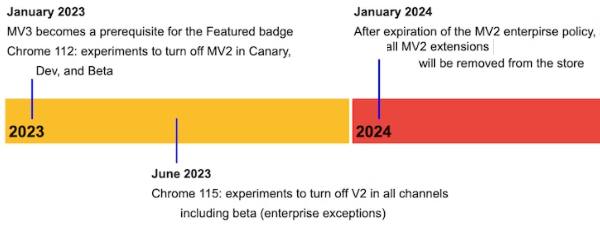| Google Stays Execution Of Adblockers |
| Written by Ian Elliot | |||
| Monday, 03 October 2022 | |||
|
Google has revised the timetable for phasing out Manifest V2 as Chrome extensions transition to Manifest V3. Now V2 extensions have a new deadline of January 2024 for holders of an Enterprise policy. UPDATE (December 2022) See Google Delays Manifest V3 Again for news of a further postponement. Manifest V3, Google's solution to issues of web security and privacy, has been dubbed the "adblocker killer". Work on its new and revised APIs started some years ago and has faced many issues - technical and political. Both extension developers and end users have expressed opposition to the phasing out of Manifest V2 and now Google has a revised timetable for ending its support which, it claims, gives everybody more time to adopt V3. According to David Li, who announced the more gradual and experimental approach to what is going to be a major upheaval "This change will give Chrome users increased safety and peace of mind while browsing and installing extensions by providing more transparency and control over permissions, adding stricter protocols for accessing resources outside the extension’s context, and ensuring that extensions work well on all devices." He provided the following details of how Manifest V2 support is being phased out:
The stay of execution, i.e. the extension of support for Manifest V2, is for enterprises and is restricted to those who have the ExtensionManifestV2Availability enterprise policy. Li also provided milestones for how the Chrome Web Store is transitioning to Manifest V3:
The key change in Manifest V3 is limiting the use of the webRequest API, which until now allowed extensions to interact with each and every request to download a file or resource.This essentially allowed an extension to monitor, analyze and block web traffic. In particular, it allows adblockers to detect when a web page tries to download an ad and block it. The replacement API is declarativeNetRequest which requires a list of URLs that need attention - hence "declarative". The actual work in implementing the list is done internally by the browser, making it faster and more secure. The only problem is that the number of URLs and the nature of the URLs is limited and this effectively defeats ad blocking using a Chromium-based browser, see Google Changes API Making Chrome Adblocking Harder and Google To Limit Ad-blockers In Manifest V3 for more details. Mozilla has pledged to continue to support Manifest V2 in Firefox. The Vivaldi browser recently made the same commitment and, since Google announced the revised timetable, Brave has tweeted that Manifest V3 will not prevent Brave from blocking ads as it has ad blocking built in. Will Chrome, and Microsoft Edge which is based on the same engine, will see a long-term decline in traffic? We'll have to wait until 2024 to find out.
More InformationMore details on the transition to Manifest V3 Related ArticlesGoogle To Limit Ad-blockers In Manifest V3 Google Changes API Making Chrome Adblocking Harder Google Adds New Chrome Extension Badges Chrome Takes Over Web - Blocks Edge Microsoft To Go Chromium Update: Confirmed Brendan Eich Launches Brave New Browser To be informed about new articles on I Programmer, sign up for our weekly newsletter, subscribe to the RSS feed and follow us on Facebook or Linkedin.
Comments
or email your comment to: comments@i-programmer.info |
|||
| Last Updated ( Tuesday, 13 December 2022 ) |



